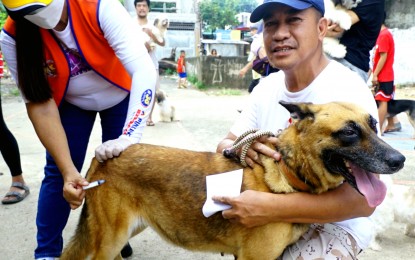
ANTI-RABIES SHOT. Reynaldo Cacayorin holds his pet Belgian Malinois while it is getting vaccinated with anti-rabies in Camarin, Caloocan City on Sept, 16, 2022. The Philippines has recorded an 8 percent decrease in rabies cases, down to 259 from Jan. 1 to Sept. 2, compared to the same period last year, the Department of Health reported Thursday (Sept. 21, 2023). (PNA photo by Ben Briones)
MANILA – The Philippines has recorded an 8 percent decrease in rabies cases, from 282 down to 259 from Jan. 1 to Sept. 2, compared to the same period last year, the Department of Health (DOH) reported Thursday.
However, citing latest data, the agency said cases have shown a continuous increase, reporting 29 new cases in the recent four weeks.
Cases increased in the National Capital Region, Ilocos Region, Central Luzon, Region 4-B (Mimaropa), Bicol Region, Central Visayas, Eastern Visayas, Zamboanga Peninsula, Soccsksargen and Caraga "in the recent three to four weeks and/or one to two weeks".
In the past four weeks, one to three new cases have been reported.
"Proper wound management is important when dealing with animal bites. Likewise, immunization is critical to prevent rabies infection," the DOH said, noting that there are two types of immunization given to animal bites, depending on the severity and site of the animal bite.
Rabies vaccines are given if a person gets minor, superficial scratches, or abrasions without bleeding, including those induced to bleed below the neck.
Meanwhile, rabies vaccines and rabies immunoglobulin are given if a person has puncture wounds, lacerations, avulsions or scratches, abrasions with spontaneous bleeding, or scratches and abrasions located in the neck and head.
"Generally, from zero up to 10 days of bite from a rabid animal, a person may experience non-specific manifestations, such as fever, sore throat, anorexia, nausea, vomiting, generalized body malaise, headache and abdominal pain," the DOH said.
"Afterwhich, manifestations such as hyperactivity, hypersalivation, disorientation and hallucination, bizarre behavior, seizures, nuchal rigidity or paralysis appear."
The public, especially those who have been bitten, is advised to immediately seek medical attention through animal bite centers in communities.
Pet owners are also reminded to be responsible by looking after their pets and having them vaccinated. (PNA)
